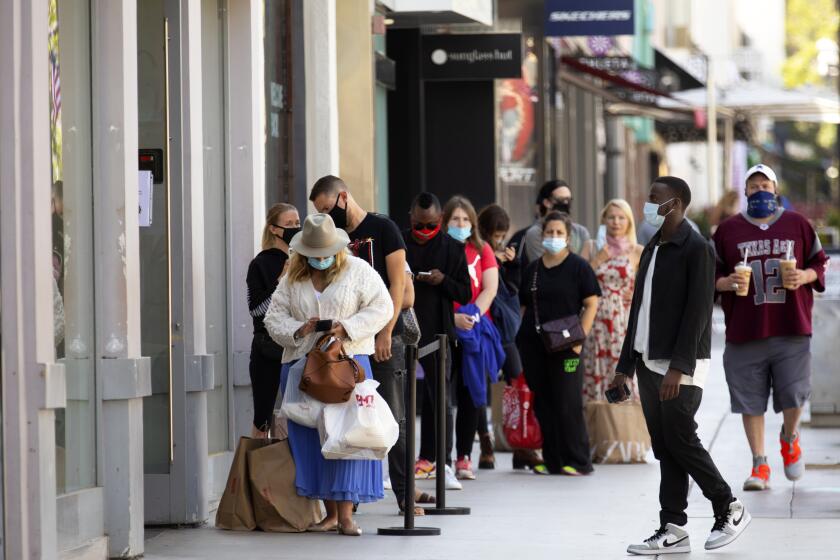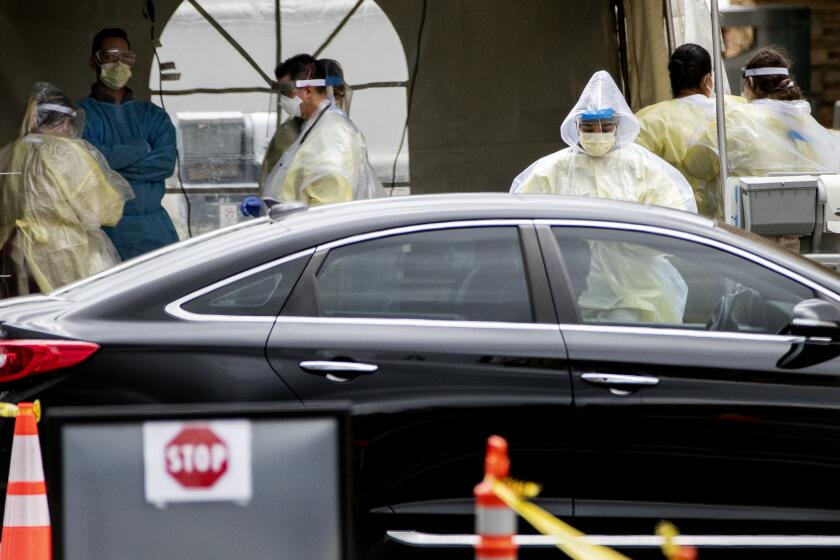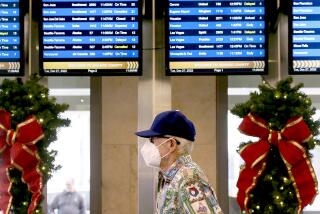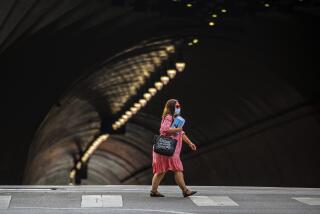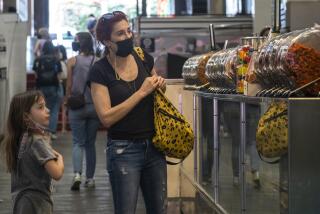L.A. could reimpose stay-at-home order if coronavirus spike continues, mayor warns
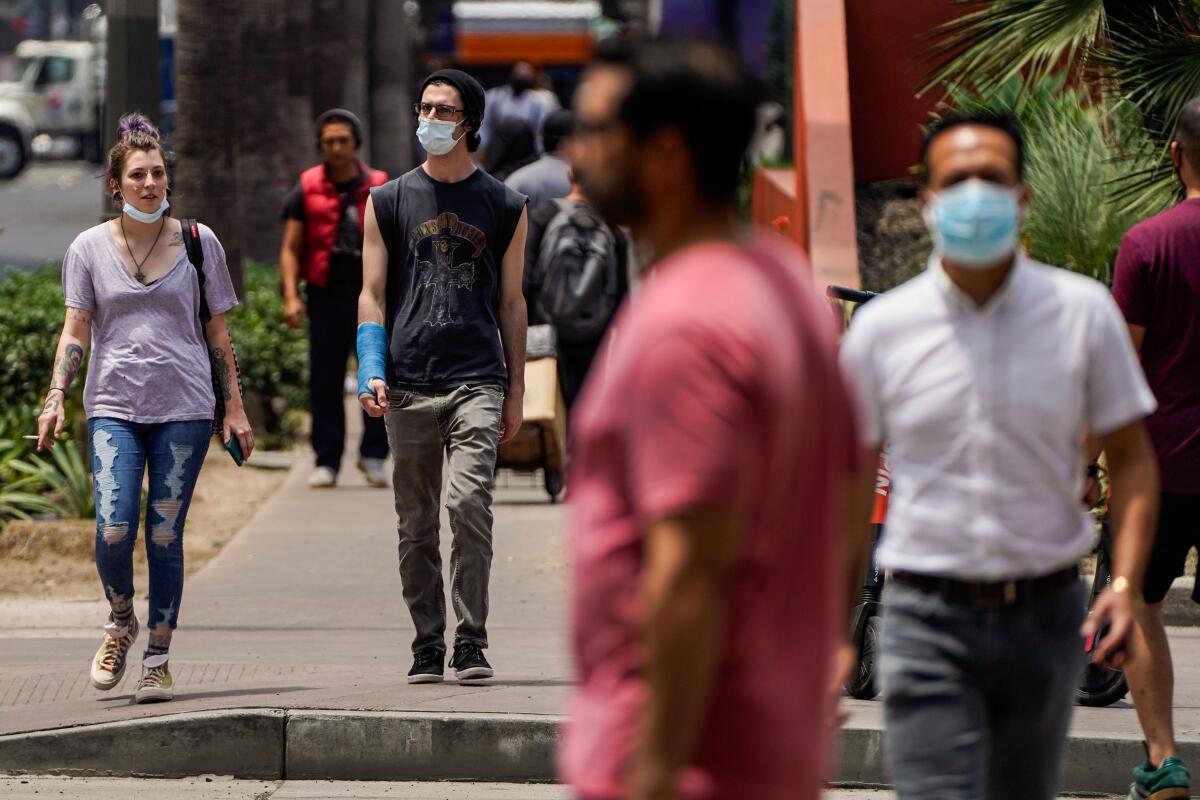
- Share via
Los Angeles residents could again be ordered to stay home to stem the spread of the coronavirus should infections and hospitalizations continue to climb, Mayor Eric Garcetti warned Wednesday.
The potential return of the kind of strict restrictions that kept Angelenos indoors and effectively shuttered wide swaths of the region’s economy is yet another indicator of what elected and health officials have maintained for weeks: that the threat of COVID-19 remains real, and trend lines are heading in the wrong direction.
As Garcetti put it: “COVID-19 hasn’t gone away. In fact, it’s gotten worse.”
“We know so much more about this disease today than we did in March when it first hit us, and that means we can make targeted interventions to stop the spread of this novel coronavirus,” he said during an evening briefing. “But making sure we don’t have to go farther and close more businesses requires an individual commitment of each and every one of us.”
According to a color-coded system L.A. unveiled last week to assess and report the risk of coronavirus infection, the local threat level remains orange — meaning that the risk remains very high and residents should assume everyone around them is infectious and minimize all contact.
“If things get worse, that dial could move to red in this coming week or two,” Garcetti said. “That would place us at the highest risk of infection, and we’d likely return to a mandated safer-at-home order. But, if things get better, we’ll see that dial back down to yellow, indicating we’re successfully flattening the curve again.”
The new tool was released as L.A., like many areas in California and the U.S., sees distressing spikes in COVID-19 infections and hospitalizations.
Garcetti’s warning comes as coronavirus conditions continue to deteriorate across California.
The state recorded its highest single-day coronavirus death toll Wednesday, with 149 fatalities reported, according to a Los Angeles Times county-by-county tally. That surpassed the previous highest daily death toll of 132 that was recorded May 19.
In Los Angeles County, the single-day death toll of 61 Wednesday was the highest since June 2. The county announced 50 new fatalities Thursday, boosting the death toll to nearly 3,700, according to Public Health Director Barbara Ferrer.
The number of infections also continues to rise — with 1,777 new cases announced Thursday, pushing the total past 124,000 — as do the positivity rate and the number of hospitalizations, she said.
As of Thursday, Ferrer said, 2,037 COVID-19 patients were hospitalized countywide. Four weeks ago, the number of daily hospitalizations ranged from 1,350 to 1,450.
However, “deaths are down, conclusively,” Ferrer said. “We think, obviously, that they’re likely to go back up.”
The vast majority of those who have died in the county, about 93%, had some kind of underlying health condition, she said.
Officials also continue to note worrying disparities in how the coronavirus affects residents of color. Compared to white people, “Latino/Latinx people are more than twice as likely to contract the virus and are also twice as likely to die,” while Black Angelenos “are 27% more likely to contract the virus and almost twice as likely to die,” according to county statistics.
“These, like so many of the data points that I report to you, are disheartening and distressing,” Ferrer said. “And they actually emphasize the need for us to do more so we can address the inequities across our communities.”
Regarding the possibility of reimposing a countywide stay-at-home order, Ferrer said that “nothing can be off the table in the pandemic,” but that she personally hopes “we don’t have to go back there. I hope that we figure out a way to take care of each other, to be sensible about what we’re doing.”
“Even if you don’t want them to … your actions can have an impact on somebody like me, so we’re just tied together here as a community and we have to work together to get to the other side,” she said.
Statewide, 9,500 infections were recorded Tuesday — the most new cases reported in a single day.
More than 6,700 Californians have died from COVID-19, and the state is approaching 300,000 total confirmed infections.
The state reported 9,500 infections on Tuesday, the most new cases reported in a single day since the pandemic began.
Health officials have said the seeds of the state’s recent surge were probably planted around Memorial Day, when additional businesses began to reopen and people started going out and gathering together more.
Crowds also took to the streets in California and around the nation to protest police brutality and racial injustice in the wake of the May 25 death of George Floyd. However, the impact of those demonstrations on coronavirus spread remains a matter of debate.
A significant driver of new infections has been younger Californians. Gov. Gavin Newsom said this week that younger people who might believe “they are invincible” are falling ill nevertheless.
Garcetti said Wednesday that “more than 50% of the people who are testing positive in Los Angeles County are between 18 and 40 years of age.”
While “most young people are doing the right thing,” he said, “it’s clear that a lot of them are not.”
“This isn’t complicated: Do not get together with someone who’s not in your household,” he said. “These weeks are absolutely critical: Critical to whether schools open, whether our economy and our economic recovery path continues. These weeks are critical for saving lives.”
Along with physical distancing and not gathering with people outside your household, officials continue to emphasize the importance of wearing face coverings while in public or high-risk settings, and regularly washing your hands.
Other key components of California’s coronavirus response include testing and contact tracing of those who are found to be infected.
However, there have been issues in those areas amid the recent spikes. As demand for testing has begun to outpace availability, officials in L.A. County are now prioritizing testing for those who are either showing symptoms, work in a high-risk environment or have come in contact with a person known to have been exposed to the virus.
San Bernardino County also has had to limit COVID-19 testing in the face of supply shortages.
“We are continuously trying to obtain the necessary resources to ensure that we can provide testing in our county at peak capacity,” interim county Public Health Director Corwin Porter said in a statement.
Officials in neighboring Riverside County are urging residents to cooperate with contact tracers who are trying to investigate potential COVID-19 exposures.
“Unfortunately, in many cases, the person who is contacted is not providing the information that is being sought,” county Public Health Director Kim Saruwatari said in a statement. “This information is critical as we work to slow and eventually stop the spread of coronavirus. It is understandable that patients may be reluctant to discuss sensitive issues, but it is very important that this information is provided.”
Times staff writers Hannah Fry, Colleen Shalby, Rong-Gong Lin II and Patrick McGreevy contributed to this report.
More to Read
Sign up for Essential California
The most important California stories and recommendations in your inbox every morning.
You may occasionally receive promotional content from the Los Angeles Times.
